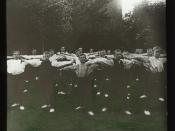Most of us feel low sometimes, usually due to a stressing or traumatic event in our lives. But ongoing depression, a period of suffering known as major depression, is another matter. Depression is the most common psychological problem in the United States. Seventeen percent of Americans will suffer from a major depressive episode in their lifetime (Davidson, 1998). With the ever-increasing cost of health care in the United States alternative and preventative treatment in dealing with psychological conditions should by explored and exploited. Exercise, as a treatment appears to have therapeutic value in reducing depression. Aerobic exercise if performed at sufficient duration and intensity has corelational links to positive psychological effects.
Besides the increases of self-image that are the result of weight loss and muscle toning, aerobic activity effects other aspects of the psyche. Research in the area of exercise and its links to improved psychological states has dramatically increased in the last several decades.
Several studies have examined the acute and chronic effects of physical activity. Optimal results have been achieved when the following guidelines are followed (Artal, 1998): ÃÂ÷ Physical activity is aerobic, such as running, walking, or swimming ÃÂ÷ Activity is done at 60-80% of maximal heart rate ÃÂ÷ Bouts of exercise are sustained for 20-40 minutes and occur 3 times a week ÃÂ÷ A routine is practiced over an extended period of time, generally 6 > weeks.
Although exercise has been linked to positive effects in psychological states, aerobic exercise is much more effective than anaerobic activity. Aerobic activity is defines as physical activity that increases pulmonary and cardiovascular systems. The body uses and transports oxygen to the working muscles in order to maintain activity. Anaerobic activity is physical activity that is either of short duration or of insufficient intensity to require transporting of oxygen to...


